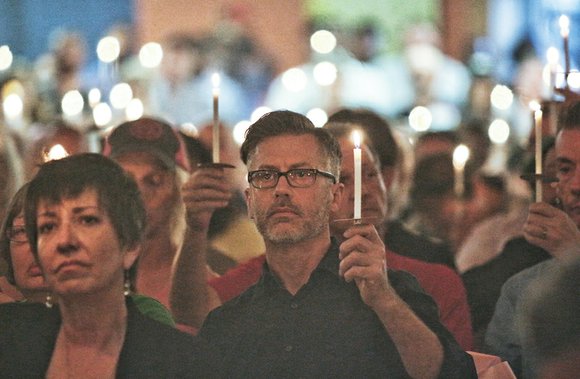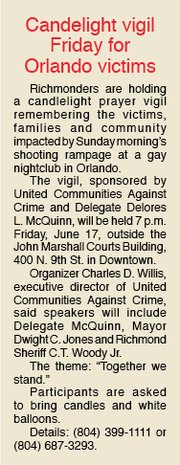Grief unifies nation
Richmond mourns in solidarity following Orlando massacre
Free Press staff, wire reports | 6/17/2016, 11:10 a.m.

In what has become all too common, several Richmond churches and community groups gathered this week to hold vigils and pray for victims of gun violence.
This time, the songs of solace and tears of despair were for the slaughter unleashed Sunday morning when 29-year-old gunman Omar Mateen killed 49 people and wounded 53 others at an Orlando, Fla., nightclub frequented by lesbian, gay, bisexual and transgender patrons.
Numerous reports have stated that Mr. Mateen, who was shot and killed by police during the three-hour ordeal, targeted the club based on his allegiance to the Islamic State and hatred of gays. Other reports stated that Mr. Mateen struggled with his own sexual identity.
Diversity Richmond, which advocates that members of the LGBTQ community be treated with fairness, dignity and respect, held a vigil Tuesday night at its Sherwood Avenue location in North Side. Still shaken by the shootings, Bill Harrison, the organization’s president and executive director, said that while such violence is “horrific,” even more horrifying is the nation’s seeming acceptance of such tragedies.
“This type of violence — we’ve become almost numb to it,” said Mr. Harrison, adding that such incidents “still hurt.”
Mr. Harrison said Diversity Richmond’s vigil, which drew nearly 1,000 people, sought to promote healing and building bridges. Vigils are just one step in trying to stem gun violence based on race, religion or sexual orientation, he said. Too often when such tragedies occur, they are discussed for “two or three days” and then forgotten, he said.
Mr. Harrison wants Diversity Richmond to begin conversations about how Richmond can become more unified. He also believes that the presence of Imad Damaj, a professor of pharmacology and toxicology at Virginia Commonwealth University who is president and founder of the Virginia Muslim Coalition for Public Affairs, will help increase understanding between the gay and Muslim communities.
According to the coalition’s Facebook page, its goal is “to foster proper understanding of Islam and Muslims” in the Richmond region and across Virginia.
Mr. Mateen left behind a tangled trail of possible motives for the massacre. He also called police during his rampage to voice allegiance to various militant Islamist groups.
Federal investigators have said Mr. Mateen was likely self-radicalized and there is no evidence that he received any instruction or aid from outside groups such as Islamic State. Mr. Mateen was a U.S. citizen, born in New York of Afghan immigrant parents.
“He appears to have been an angry, disturbed, unstable young man who became radicalized,” President Obama told reporters Tuesday after a meeting of the National Security Council.
One official familiar with the investigation, who spoke on the condition of anonymity, said investigators are only beginning to delve into the contents of Mr. Mateen’s cellphone and other electronic devices. The source said they believe Mr. Mateen browsed militant Islamic material on the internet for two years or more before the Orlando shootings.
Mr. Mateen’s wife attempted to talk him out of the attack, NBC News reported on Tuesday, citing officials familiar with her comments to the FBI.
The attack on the Pulse nightclub in the central Florida city was the deadliest mass shooting in modern U.S. history, and the worst attack on the lesbian, gay, bisexual and transgender community.
Soon after the attack, Mr. Mateen’s father indicated that his son had harbored strong anti-gay feelings. He recounted an incident when his son became angry when he saw two men kissing in downtown Miami while out with his wife and young son.
The Orlando killings came six months after the massacre of 14 people in San Bernardino, Calif., by a married couple professing Islamist militant ideologies.
Angel Colon, who was in Pulse with friends at the time of the attack, described hearing gunfire and falling to the floor, shot in the left leg.
“I couldn’t walk at all,” Mr. Colon told reporters at Orlando Regional Medical Center, where he was among 27 survivors being treated. “All I could do was lay down. People were running over me.”
Mr. Colon said he had a hopeful moment when Mr. Mateen went into a bathroom — where he later took hostages — but the gunman then emerged, systematically making his way through the club shooting people who were already down, apparently to ensure they were dead.
“I look over and he shoots the girl next to me and I was just there laying down and thinking, ‘I’m next, I’m dead,” Mr. Colon said.
Mr. Mateen shot him twice more, one bullet apparently aimed for Mr. Colon’s head but striking his hand, and another hitting his hip, Mr. Colon recalled.
When police drove Mr. Mateen back into a restroom, an officer dragged Mr. Colon to safety, he said.
Two U.S. officials, both of whom have been briefed regularly on the investigation and requested anonymity to discuss it, said that if it emerged that Mr. Mateen led a secret double life or had gay impulses that conflicted with his religious beliefs, it might have been a factor in explaining his motive.
“It’s far too early to be definitive, and some leads inevitably don’t pan out, but we have to consider at least the possibility that he might have sought martyrdom partly to gain absolution for what he believed were his grave sins,” one of the officials said.
The official noted that the concept of martyrdom is not confined to Islam, as Christians also venerate martyrs who died for their beliefs.







